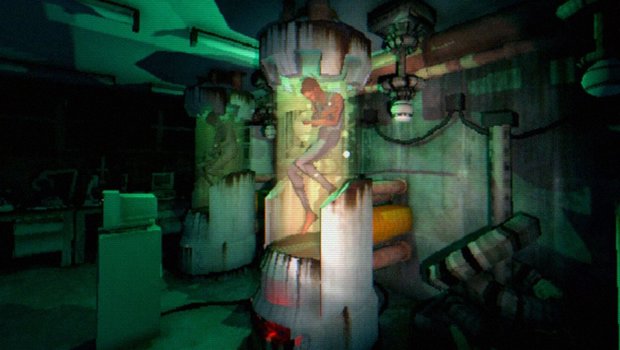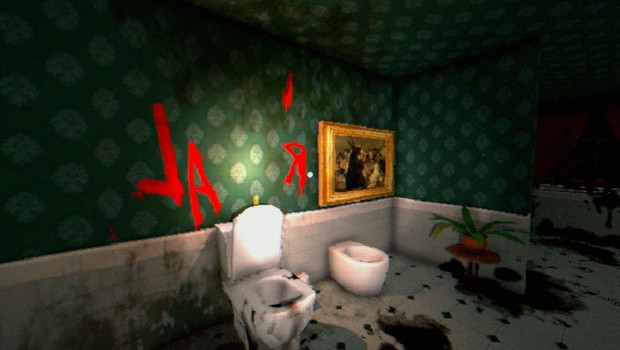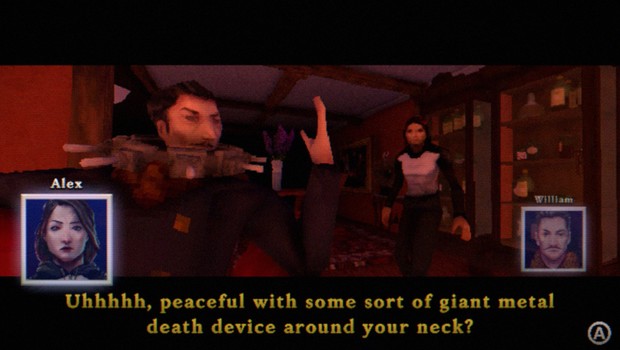The Tartarus Key review

- 0 Comments
Plenty of captivating escape room-style fun to be unlocked in this nostalgic PS1-era throwback
As someone who enjoys a good escape room experience, I was immediately intrigued by the premise behind Vertical Reach’s mystery thriller The Tartarus Key. Give me a room filled with devious devices and perplexing puzzles, and you’ve got my attention. Make it a whole mansion, complete with deadly traps and multiple victims who must band together to survive or die trying, and I can’t boot up the game fast enough. Fortunately, The Tartarus Key doesn’t just promise but delivers a fun and engaging experience that’s equal parts The 7th Guest and Saw, viewed through the charming lens of an original PlayStation-era survival horror title. The fact that some of its most fiendish enigmas are entirely optional means it’s well worth checking out for puzzle and thriller enthusiasts of every caliber and skill level.
Alex Young has no idea where she is or how she got to the locked personal office she wakes up in, fully furnished with a desk, couch, cabinet, and a shelf overflowing with books but otherwise seemingly abandoned. All she knows is that she wants to get the heck out of there. The surveillance camera mounted in a corner tracking her as she moves around the room (in free-roaming first-person view) is the first indicator that Alex isn’t as alone as it at first seems. The second is the walkie-talkie on the desk, through which Alex makes contact with a private investigator named Torres, who claims to be similarly trapped against her will. Searching the office turns up several scattered postcards with cryptic messages scrawled on them, and a safe with a numeric keypad. It’s up to you to decipher the code needed to open the safe and retrieve the door key, letting Alex escape the first of many puzzle rooms she’ll need to deal with in her trip through the mansion.
After solving another puzzle in the adjoining bedroom and making your way out, you’ll find yourself in a hallway with multiple doors branching off it. Your first order of business is to free Torres, who is imprisoned just down the hall. From there on out, you’re granted some small degree of freedom to explore larger sections of the mansion, tackling individual escape room sections in any desired order, although Resident Evil-style locked doors with themed lock-and-key combinations ensure that you can’t completely break the intended sequence.

Along the way you will have to engage with a good variety of different puzzles and devices to progress, the vast majority of which are well thought out and entertaining to solve. A small planetarium requires becoming familiar with zodiac signs and star charts, the kitchen proffers up dinner recipe cards that must be interpreted correctly to unlock an adjoining door, and a makeshift surgery suite comes equipped with shelves of medical texts and machinery that can be used to synthesize an antidote to a lethal poison. A cocktail lounge, a meat locker hung with full slabs of beef, a library stocked with books about famous serial killers through the ages – there’s a nice range of rooms with thematically appropriate puzzles to work through.
The task of exploring a large mystery mansion isn’t as overwhelming as it maygf appear, however. Puzzles found within a room – and even inventory items picked up within it – are typically contained to that room, so there’s no need to keep track of things acquired early on for much later use. At most, an escape section may start in one room and extend into an adjoining room, but leaving a room even wipes the inventory clean (though items picked up there will reappear if you come back later). Unlike real-life escape rooms, there is no hint system for you to take advantage of (nor a ticking timer during puzzles), but this isn’t a harmful omission as the objectives are usually clearly communicated. In fact, only two puzzles stumped me with some ambiguous objectives, and one of these was designed so that players would progress whether they solved it successfully or not.
The puzzles that allow you to fail relate to the other captives you encounter. During your explorations, you will stumble upon more abductees, each imprisoned in separate parts of the house. Unlike Alex, however, these individuals (there are four of them in total, plus Torres) are all in imminent danger of being killed when you find them – one is wearing an explosive collar, for example, while another has been injected with a lethal poison – and serve as little more than high-stakes puzzles for you to solve in order to save them. Succeed and they live, joining Alex’s growing band of survivors; fail and they meet a gruesome end, though Alex and Torres’s story continues on no matter what. While saving all the victims is essential to reach the game’s true ending (and enterprising players can easily abuse the game’s save-anywhere system to retry each victim’s puzzle section as often as it takes), their actual presence in the group doesn’t add much beyond some additional lines of dialogue in the narrative scenes.

As it turns out, said dialogue is also one of the game’s highlights. While the puzzles make for a satisfying meat-and-potatoes main course, the interactions between characters are a snappy, humorous, and well-written garnish that elevates the entire meal. Alex is an immediately likeable protagonist, and even her internal trains of thought showcase her clever and quick-witted personality. In no time flat, she and Torres fall into a natural repartee as if they’d known each other for years – an important trait for the only two constants in this variable-filled narrative. Since the rest of the cast is far more expendable (by nature), they suffer from personalities that fade into the background as soon as their respective life-or-death scenarios are wrapped up.
Although none of it is voiced, the dialogue – initially only via walkie-talkie, later in person – paints the mansion’s surreal and horrific events in an enjoyable, quirky light that’s hard to find fault with. Perhaps there’s the occasional awkward tonal shift when a tense scene is interrupted by a comedic bit (like early on while investigating a blood-streaked bathroom, I triggered a conversation between Alex and Torres that saw the pair discussing three-ply toilet paper), but in retrospect it made me smirk anyway and remained stamped into my mind as another memorable moment.
Lighthearted bits of dialogue notwithstanding, The Tartarus Key does do its serious subject matter justice, and even dips into supernatural cosmic horror elements, particularly for those pursuing its true ending. Early indications that there may be far more at play than first meets the eye include stumbling upon a foreboding pentagram scrawled in the middle of a sitting room, paintings that seem to bleed, and Alex’s reflection lending her a hand by throwing a helpful item her way. However, these paranormal seeds don’t really bear fruit until one advances into “true ending” territory; finishing the game without uncovering the whole story or without saving everyone prompts one of multiple “where are they now?” endings, detailing each surviving character’s life as they move on from their ordeal, though always wondering what was really behind the events at the murder mansion.
In the absence of any actual voice acting, the puzzle-centric gameplay is instead accompanied by an ever-present musical score that, though it doesn’t particularly stand out, serves to raise tension, underline the spook factor, and emphasize the otherworldly mystery behind it all. Aesthetically, it’s easy to draw parallels to some favorite games from years past, with chunky character models and a throwback, pixelated 3D visual style that benefits from the moody lighting as well as the nostalgic PS1 survival horror feelings it evokes.
More controversial, in my book, was the developer’s choice to present the whole game through a graphical filter that keeps everything on-screen always in slight motion, even when standing still or during cinematics. This produces a sort of underwater rippling effect to the objects, furnishings, and characters in a room that I found to be, at best, distracting. This choice was even more confusing to me when I eventually learned – a good three-quarters through the game, mind you – that this option could be turned off in the settings menu, but was switched on by default. I wish I’d known from the start (so you’re welcome), because it caused a visual unpleasantness that served no discernible purpose that I could tell.
Final Verdict
I very much enjoyed my time with The Tartarus Key, which, at five or six hours has enough content to satisfy without outstaying its welcome. The setting and presentation elicit that feeling of old-school survival horror comfort food, though this is neither really a horror game nor features any survival or action elements. Instead, the focus is squarely on entertaining puzzles with just the right level of challenge. Its few missteps – a couple of less-well-clued obstacles, lack of voice acting, a floaty default graphical setting – are easily made up for by its stronger qualities, not the least of which is some excellently crafted and natural-sounding dialogue between its central characters. Add it all up and fans of puzzle-centric gameplay and fun character interaction should find more than enough to enjoy here to make the trek through this murder mansion worth their while.
Hot take
Those who fondly remember cracking conundrums in The 7th Guest’s Stauf Mansion or feel nostalgic for the early 3D graphics of Resident Evil’s Spencer Mansion will feel right at home in The Tartarus Key, with its plethora of engaging puzzles and well-written cast that’ll welcome you in and make your stay a memorable one.
Pros
- Fun and engaging escape room-style puzzles
- Witty banter that imbues characters with great personality
- Atmospheric throwback presentation that hits a nostalgic sweet spot
- Multiple endings for those that want to dig deeper into the lore
Cons
- One or two puzzles with overly obtuse objectives
- Distracting default graphical setting that fortunately can be switched off
Pascal played The Tartarus Key on PC using a review code provided by the game's publisher.










0 Comments
Want to join the discussion? Leave a comment as guest, sign in or register in our forums.
Leave a comment